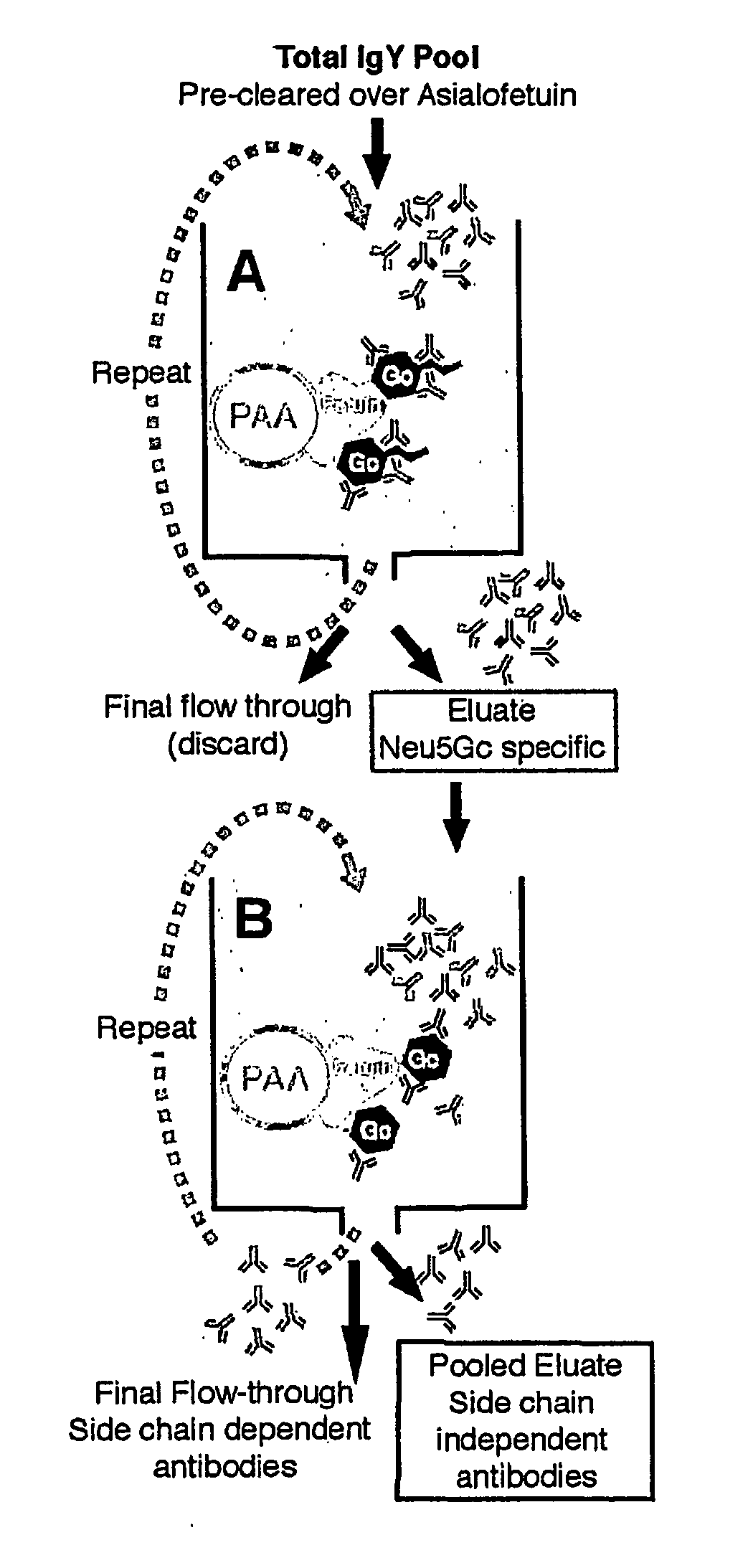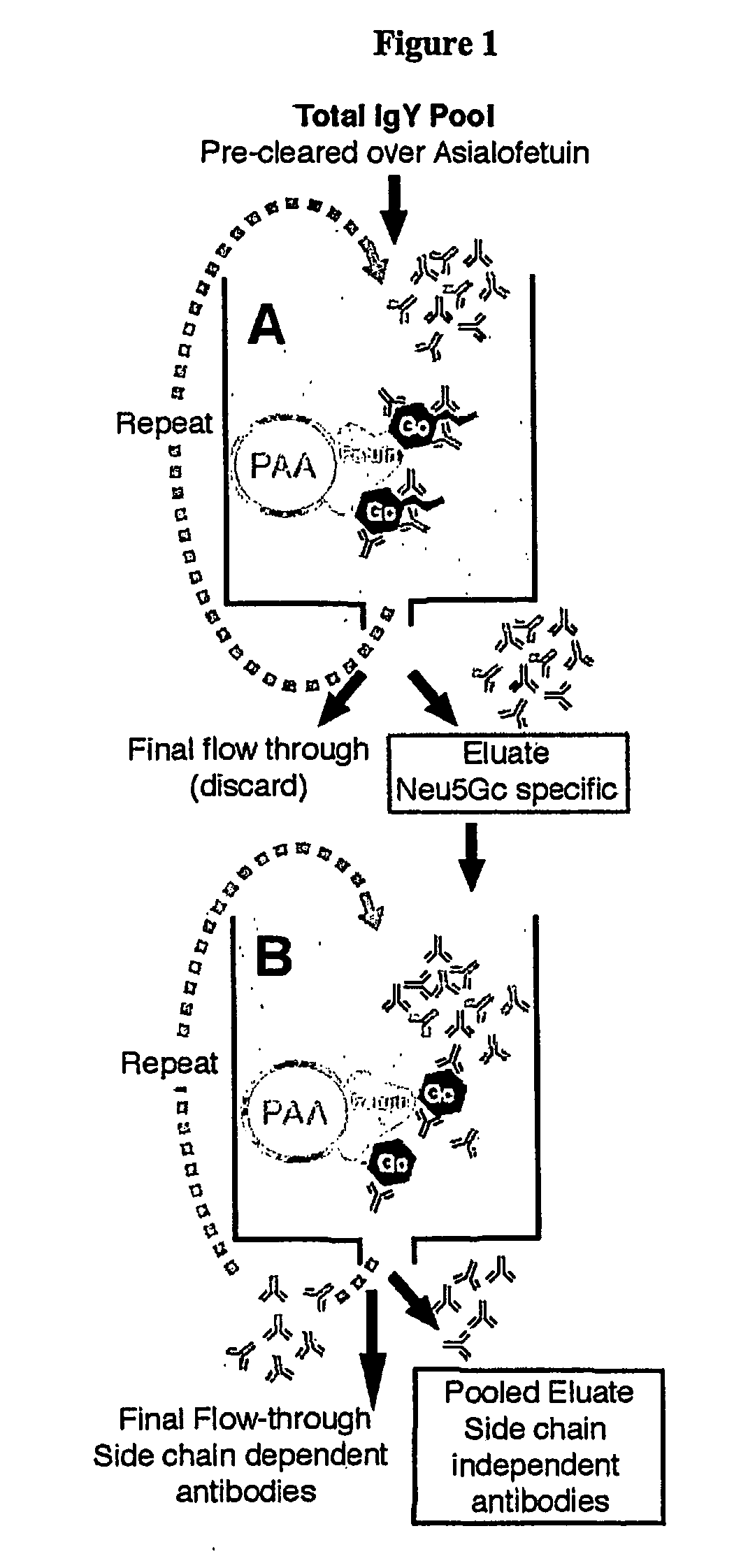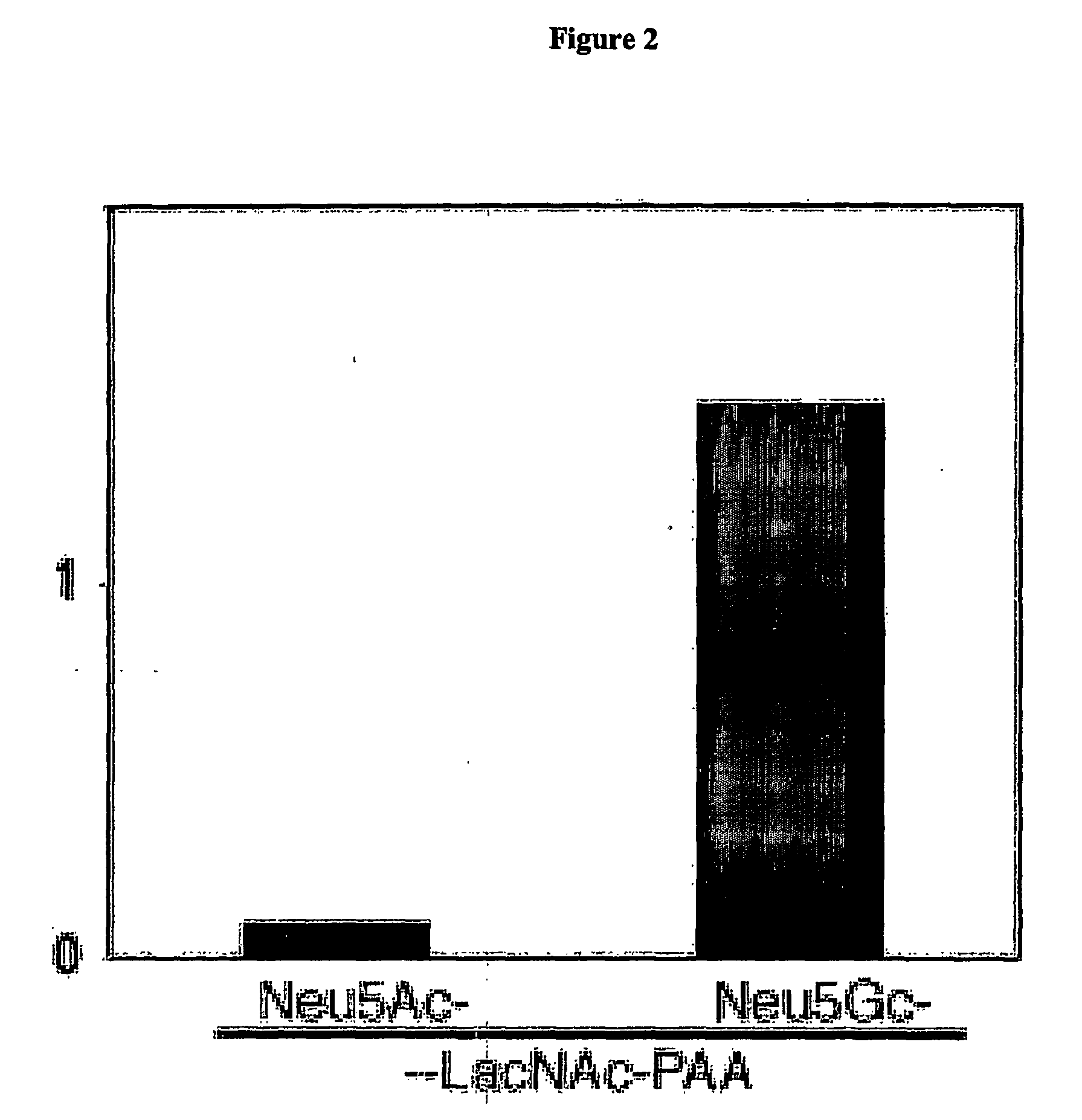Methods for Detecting and Analyzing N-Glycolynlneuraminic Acid (Neu5Gc) in Biological Materials
a technology of nglycolynlneuraminic acid and biological materials, applied in the field of sialic acid chemistry, metabolism and antigenicity, can solve the problems of inconclusive prior data about the frequency and distribution of neu5gc expression in tumors, undefined specificity of polyclonal antibodies used, and inability to achieve absolute specificity of neu5gc assays in all previous studies, etc., to facilitate the occurrence of a variety of diseases and facilitate dietary recommendations
- Summary
- Abstract
- Description
- Claims
- Application Information
AI Technical Summary
Benefits of technology
Problems solved by technology
Method used
Image
Examples
example 1
Preparation and Characterization of Chicken Anti-Neu5Gc Antibodies
[0053] Generation of a Monospecific Chicken Polyclonal Antibody against Neu5Gc—Lipids were extracted from horse erythrocytes (Rosenberg, et al., supra), suspended in water, dialyzed against water, and fractionated on DEAE Sephadex A-25 (Schauer, et al., supra). Eluted fractions containing GM3(Neu5Gc) were detected by HPLC, concentrated by evaporation, dialyzed against water and taken to dryness. Chickens were immunized and boosted with 1 mg each of GM3(Neu5Gc) (Angata, et al., supra), except that BSA was not methylated. Other Neu5Gc-containing antigens could also be used. Egg yolks were collected, a total IgY fraction obtained by 40% ammonium sulfate precipitation, and dialyzed repeatedly against PBS, pH 7.4. Antibody titer was monitored by horse erythrocyte hemagglutination, and the pool stored at −20° C.
[0054] Columns for Affinity Chromatography—The column for pre-clearing had 81.2 mg of bovine asialofetuin (Sigma...
example 2
Studies Using Chicken Anti-Neu5Gc Antibody
[0059] Immunohistochemistry using the Chicken Anti-Neu5Gc Antibody—Human tissues were collected from autopsies or unused pathological material, frozen in OCT compound (VWR International) and archived at −70° C. Frozen chimpanzee tissue was provided by the Yerkes Primate Center, Atlanta, Ga. Frozen tissue sections were air-dried for 30 min., fixed in 10% buffered formalin for 30 min, endogenous peroxidase activity quenched and non-specific binding sites blocked with 5% (Neu5Gc free) human serum in PBS for 30 min. Sections were then incubated with the anti-Neu5Gc antibody in 5% human serum / PBS at a 1:200 dilution at room temperature (RT) for 2 h. After washing, HRP-conjugated donkey anti-chicken IgY antibody in 5% human serum / PBS at a 1:100 dilution was applied for 1 hr. Control sections were incubated with secondary reagent only. Specific binding was detected using the Nova Red substrate kit (Vector Laboratories, Burlingame, Calif.), followe...
example 3
Uptake of Neu5Gc by Cultured Human Cells
[0065] Feeding of Human Epithelial Cells with Neu5Gc—Caco-2 cells (human epithelial cells isolated from a primary colon carcinoma, ATCC, Manassas, Va.), were propagated in α-MEM (Gibco, Invitrogen Corporation, San Diego, Calif.) supplemented with 20% heat inactivated Fetal Calf Serum, at 37° C., 5% CO2. Prior to feeding, the cells were split and cultured for 4 days in α-MEM supplemented with 20% heat inactivated premium human serum type AB (Irvine scientific, Santa Ana, Calif.). Cells were then cultured in the presence of various concentrations of free Neu5Gc (0, 0.3, 1 and 3 mM, respectively) for 3 days at 37° C. Cells were then washed with cold PBS, scraped into 20 mM sodium phosphate pH 7.5 and sonicated. The protein extract was quantified and analyzed by Western blot using the anti-Neu5Gc antibody.
[0066] Western Blot Analysis—Serum proteins or total proteins extracted from Neu5Gc-fed or non-fed Caco-2 cells were either treated or sham tr...
PUM
| Property | Measurement | Unit |
|---|---|---|
| pH | aaaaa | aaaaa |
| pH | aaaaa | aaaaa |
| pH | aaaaa | aaaaa |
Abstract
Description
Claims
Application Information
 Login to View More
Login to View More - R&D
- Intellectual Property
- Life Sciences
- Materials
- Tech Scout
- Unparalleled Data Quality
- Higher Quality Content
- 60% Fewer Hallucinations
Browse by: Latest US Patents, China's latest patents, Technical Efficacy Thesaurus, Application Domain, Technology Topic, Popular Technical Reports.
© 2025 PatSnap. All rights reserved.Legal|Privacy policy|Modern Slavery Act Transparency Statement|Sitemap|About US| Contact US: help@patsnap.com



